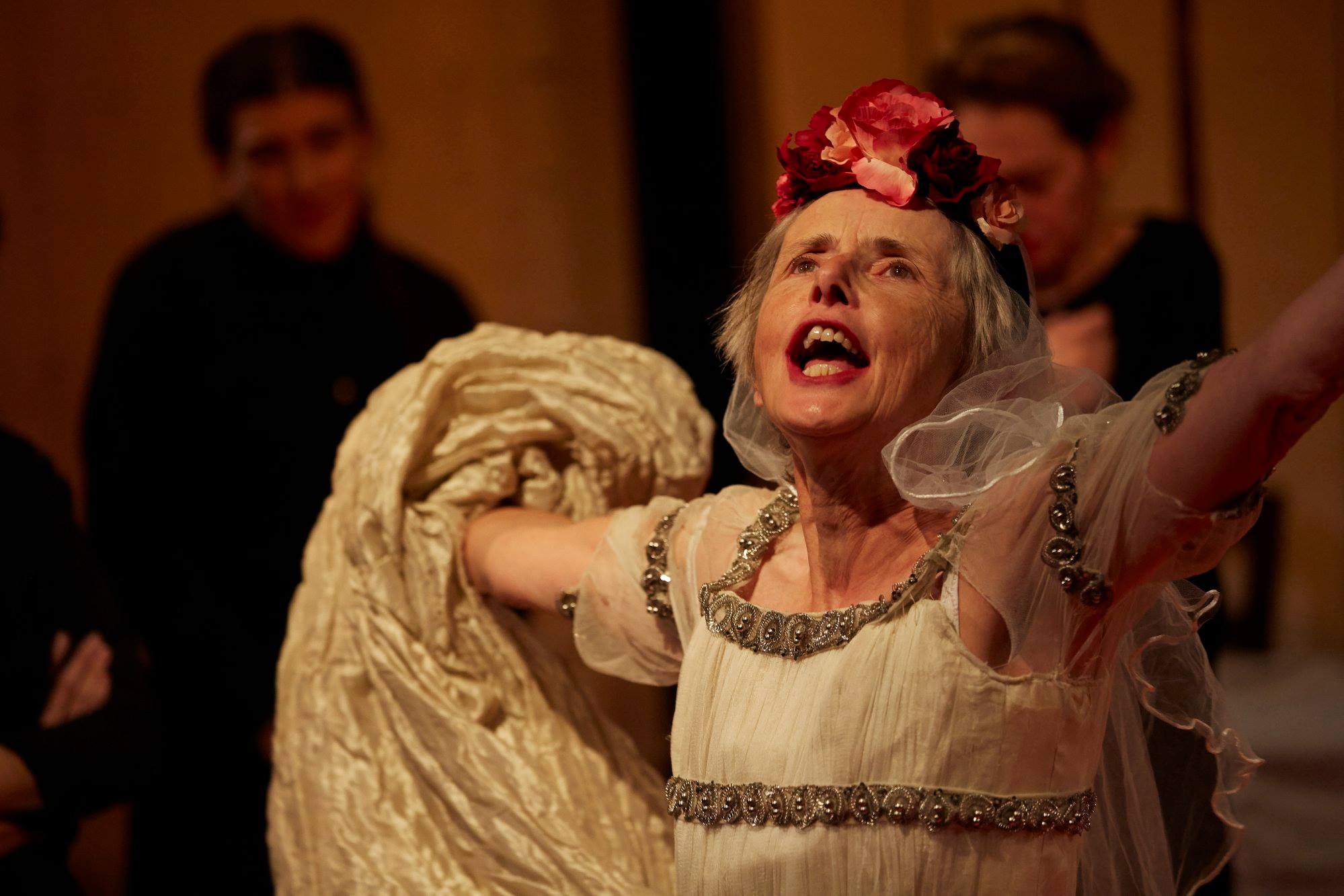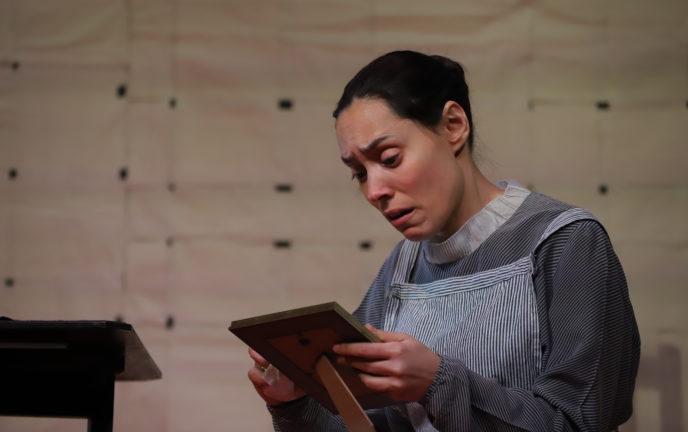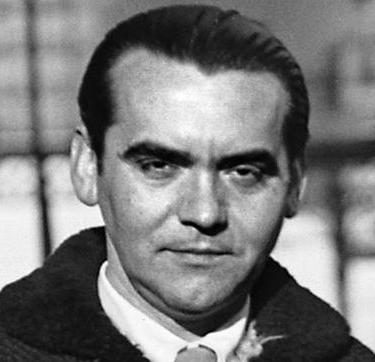‘To be Born a woman is the worst fate’ moans the maid, in this play, described by Lorca as a ‘drama of woman of the villages of Spain’. Lorca delves deep into the souls of the women in this family who are torn apart by the dire circumstances of their situations.

Teresa del Olmo as Bernarda Alba
Following the death of her second husband, Bernarda Alba (a magnificent Teresa del Olmo) imposes an asphyxiating period of 8 years of mourning upon her five unmarried daughters. When the eldest daughter, Angustias (Teresa Cendón), inherits a fortune, despite hitting 40, she attracts the attention of Pepe el Romano, who is considerably younger and whom all the sisters covet. When the engagement is announced, their emotions explode, in particular Adela (Estrella Alonso), the youngest, who is prepared to live as his lover regardless of reputation.
Another of Bernarda’s victims in this claustrophobic household is Bernarda’s mother, Maria Josefa, (superbly played by Judith Arkwright), who, considered mad, is locked up. Offering moments of light relief in her demented madness, she manages to escape periodically, and expresses her desire for love, freedom and motherhood as she cradles a lamb in her arms. She sings apparently non-sensical songs that are all too revealing of the truth of their situation. Even the tragedy that follows does not persuade Bernarda Alba to stray from her horrific demands.

Judith Arkwright as María Josefa, Bernarda's mother.
A black shadow covers them all. From the black of their clothing, the lack of light or warmth, the prohibition even to dream or hope, right to the darkness that pervades their souls, as they are repressed by the rigid norms of Bernarda’s vision of a traditional society that has no pity. It is not the reality that matters to Bernarda, but how it is perceived by others. This is expressed in her obsession for cleanliness and terror of scandal, while she, hypocritically, enlists the maid Poncia (Maite Jiménez) to pick up all the local gossip and bring it to her at once.
There is an egregious absence of any men, that serves to heighten the all-pervading sexual tension that burns out of sight, constantly under the surface. This unbearable oppression leads them to express their despair with resignation, hope, rebellion, fury and madness as they all suffer in their yearning for the love of Pepe el Romano.

Bernarda Alba and her five daughters
Playing with class, honour and position in society, Bernarda derides all those she sees as inferior, such as the maid (Laura Arnáiz) and Poncia, who, each in turn, loathe her back with equal measure.

Laura Arnaíz as the maid
Bernarda, incapable of expressing tenderness or affection, uses her sharp tongue to cruelly remind Poncia she is simply a servant, when she dares to question her on the situation to which she is condemning her daughters. Bernarda never ceases to remind the girls and Angustias in particular, that they must always be totally submissive towards men. The dead husband, Antonio María Benavides was only truly loved by the maid whom he seduced and abused, as far as his wife was concerned his role was only to procreate the next generation.
The play is dominated by the oppressive presence of Bernarda and how the five daughters and the maids manage within that claustrophobic environment. They try, in vain, to confront her authority in their desire for freedom. Each one in her own way, but, in the end, they are all buried in the quagmire of unresolved emotions, erotic frustrations and impossible love.
This is an excellent production. The sound effects and music (provided by Javier ‘Peke’ Rodríguez and Erwin Grafe) are extremely effective. The volcanic simmering of emotions illustrated with some deep throat singing that hits the gut, combined with the sudden ringing bells and the desperate unseen horse, who violently kicks at his stable to get out. It is shocking and strong.
This play is a complex piece of literature with many levels. There is Poncia’s description of a fairly happy sexual relationship with her long gone husband. The village woman who, having had a child out of wedlock, murdered it in her despair, only to be cruelly castigated for it. Men, only heard from afar, are seen as somewhat vulgar sexual beings who hunger for money or the whore dressed in her sequin dress, who is paid to accompany them to the olive grove. The harvesters are seen as virile, but any woman who succumbs to their charms is to be vilified.
In these villages it is lose / lose. There is no win/win here. Even the passionate Adela knows she could only ever have a transitory happiness. Bernarda may talk about facing death full on, but being such an indomitable character leaves one wondering whether her dead husband is finally getting the rest he might have well deserved. Not one, but two husbands seem to have managed to get away from her. Even if it was to their deaths.

Federico García Lorca
Banned until 1963 in Spain for being ‘shockingly immoral’ it premiered in Buenos Aires, Argentina in 1945. It is the third play of García Lorca’s great ‘Rural’ trilogy, after Blood Wedding (1932) and Yerma (1934).
This new production of ‘The House of Bernarda Alba’ written by a truly great artist, is excellent. It sports a wonderful cast and is not to be missed.
‘The House of Bernarda Alba’ is on at The Cervantes Theatre till April 9th in Spanish.
Mondays, Tuesdays and Thursdays Matinees at 2:30PM / Evening Performances Tuesdays through to Saturday at 7:30 PM / Further information at www.cervantestheatre.com
CAST
Bernarda Alba: Teresa del Olmo
Poncia: Maite Jiménez
Adela: Estrella Alonso
Martirio: Elena Sanz
Magdalena: Candela Gómez
Angustias: Teresa Cendón
Amelia: Adela Leiro
María Josefa: Judith Arkwright (mother)
La criada: Laura Arnáiz
Prudencia: Wakana Deska
TEAM- CREATIVE TEAM
Director Jorge de Juan / Set Designer Angel Haro / Stage Manager Diego Gutiérrez / Costume Designer Isabel del Moral / Music Javier “Peke” Rodríguez y Erwin Grafe
CERVANTES THEATRE TEAM
Artistic Director Jorge de Juan / Artistic Director Paula Paz
Production and House Manager Puerto Bak















